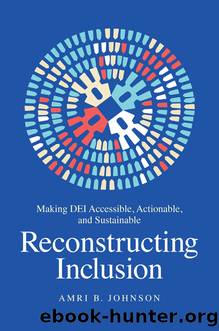Reconstructing Inclusion by Amri B. Johnson

Author:Amri B. Johnson
Language: eng
Format: epub
ISBN: 9781637741894
Publisher: BenBella Books
Published: 2022-07-04T00:00:00+00:00
The Bad
Perpetual antagonism toward progressive movements is not new. There have been various groups of people since the end of slavery who have taken on the role of the opposition in causes and ideas that promote equity. Their unstated intention, coupled with sleight-of-hand tactics, has been to spend considerable effort to delegitimize movements, theories, and even legislative mechanisms aimed at creating greater equality for all.
With intersectionality, for some, the tactic has been framing the concept as overzealous, even as having religious overtones. One conservative commentator said, âIntersectionality is becoming so influential that it haunts much of blue America in much the same way that Christian beliefs and cultures haunt the South. Even those who arenât full-on adherents have begun to adopt various intersectional habits, such as adjusting their language, deferring to experiential authority, and questioning the value of free speech.â4
Others have simply dismissed it as âstupid.â
The perceived imbalance of intersectionality is what seems to be at the root of its dissonant reception during its rise to superstardom over the past five or six years.
A core thesis of Crenshawâs work is that an increased focus on the most visible and vocal marginalizes groups of people who are multiply burdened and masks realities that cannot be understood as resulting from discrete cases of discrimination. It is easy to interpret the theory of intersectionality to be about individual experiences and as not being intricately aligned with the realities that are faced by oppressed groups because of their social standing. With a focus on individual experience, a critic can cleverly make their identity the central theme in their criticism, thus pointing at those who are anchored in the theory as being hostile and opposed to people of a particular identity who hold the most power, in solidarity with people who claim similar identities. The result is that intersectionality is often framed as a weapon against individualsâmostly white menâwho consider themselves as the targets of âintersectional mobs.â
I had an experience with a former employer that reminded me that I do not have racial privilege, although in many spaces I do have privilege of class and sexuality as a straight, heterosexual male. But I am Black, so my privilege has at least that line that it cannot cross.
As I stepped into the elevator on my way to a meeting in the executive suite of the building, I encountered a gentleman that I had seen for a few months walking about the company facilities but never had a chance to formally meet. His manager was a dear colleague who I had worked with and had a collegial relationship with. He was walking with an external vendor, and as we were making our way up to the same floor, I said hello. He didnât respond with a âhiâ or âhello.â He asked, âCan I see your badge?â
My immediate response was a bit of surprise, maybe even shock. And then a bit of confusion. After that, I calmed myself and said, âIâm sorry?â And he repeated himself, âCan I
Download
This site does not store any files on its server. We only index and link to content provided by other sites. Please contact the content providers to delete copyright contents if any and email us, we'll remove relevant links or contents immediately.
Change Management that Sticks by Barb Grant(103)
Impact with Love: Building Business for a Better World by Greg Harmeyer(100)
People and Data by Redman Thomas C.;(98)
Leadership Team Alignment by Frédéric Godart(90)
9 Powerful Practices of Really Great Teams by Stephen E. Kohn(89)
You're Too Smart for This : (Beating the 100 Big Lies About Your First Job) by Michael Ball(78)
How to Speak Human by Jackson Dougal;Jackson Jennifer;(78)
The Executive Warrior by Ng Victor;(78)
Change Your Business with NLP by Lindsey Agness(76)
Corporate Fraud Exposed by Baker H. Kent;Purda Lynnette;Saadi Samir;(75)
Leadership Transitions by Richard Elsner(72)
Leading and Managing Change in the Age of Disruption and Artificial Intelligence by Donald Mathew;(67)
Outpacer by Alex Holt(63)
Grow Regardless by Mechlinski Joe;Green Charles;(58)
Mastering Consulting as an HR Practitioner by Currence Jennifer;(57)
Social Sustainability HANDBOOK for Community-Builders by Daniel Raphael(55)
Reconstructing Inclusion by Amri B. Johnson(55)
The Culture of Women in Tech by Hardey Mariann;(55)
Digital Humans by Garrick Jones & Garrick Jones(53)
